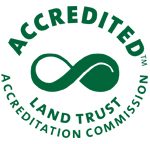“ORGANIC… THE WAY GRAMPA DID IT!”
That’s what the sign read in DeKalb County as I drove past an old farm on Rt. 23.
I thought of the McDonald Farm, our headquarters in Naperville, when I saw the sign, and felt good that we are sort of a “throw-back” to a time when farming was more in concert with Nature.
 We are very fortunate that Lenore McDonald donated her 60-acre farm in Naperville to The Conservation Foundation. She had three conditions for the donation: farming, conservation and education. She, like many farmers, understood the relationship between growing food and conservation. Indeed, a sustainable farming operation understands the two depend one each other. Without that fundamental understanding, we rely too much on chemicals to replace the natural functions Nature provides.
We are very fortunate that Lenore McDonald donated her 60-acre farm in Naperville to The Conservation Foundation. She had three conditions for the donation: farming, conservation and education. She, like many farmers, understood the relationship between growing food and conservation. Indeed, a sustainable farming operation understands the two depend one each other. Without that fundamental understanding, we rely too much on chemicals to replace the natural functions Nature provides.
Of course at the McDonald Farm, we have plenty of both. In addition to fun and engaging children’s education programs that would make Lenore smile, we have a good balance of organic food fields and plenty of conservation areas- prairie and wetlands, small patches of woods, and many native gardens that provide both beauty and function. These areas help provide pollinator plants for a myriad of insect species, including the farm’s honey bees that are essential in helping to grow your food.
Our bluebird and bat boxes provide nesting and roosting areas for many species to eat insects and keep the farm’s balance healthy. Our wetlands clean water and provide habitat for dragonflies and damselflies to eat even more bugs, which also help keep the farm’s balance healthy. Did you know that one adult dragonfly can eat up to 18,000 insects in one year? Multiply that by thousands of dragonflies- that’s a lot of bugs!
 The McDonald Farm is both a throw-back and a farm of the future. Being located in the heart of the suburbs and close to its customers, it provides a good model for other small, local farms to follow where we can keep our carbon footprint small and provide LOCAL, fresh food to people close to where they live. We also have installed many examples of positive actions people can do at home or their place of business, such as wind and solar energy (we generate about 25 percent of our office energy between the two), permeable pavers and permeable concrete to showcase storm-water best management practices, and a small green vegetative roof on the old milk house. We also have rain barrels for sale and a 25,000-gallon rainwater collection system that irrigates your vegetables. We hope that when people visit the farm, they will leave with one new idea they can employ at home or work.
The McDonald Farm is both a throw-back and a farm of the future. Being located in the heart of the suburbs and close to its customers, it provides a good model for other small, local farms to follow where we can keep our carbon footprint small and provide LOCAL, fresh food to people close to where they live. We also have installed many examples of positive actions people can do at home or their place of business, such as wind and solar energy (we generate about 25 percent of our office energy between the two), permeable pavers and permeable concrete to showcase storm-water best management practices, and a small green vegetative roof on the old milk house. We also have rain barrels for sale and a 25,000-gallon rainwater collection system that irrigates your vegetables. We hope that when people visit the farm, they will leave with one new idea they can employ at home or work.
I want to thank all of you for being a part of The Conservation Foundation and Green Earth Harvest community. We are a “whole community,” a community that understands that conservation, clean food, and our common values are tied together in what makes our lives and communities healthier.
Enjoy your Spring!
Written by Brook McDonald, President and CEO



